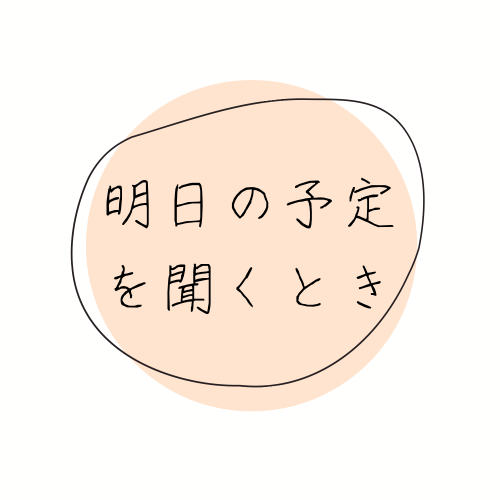When Japanese people ask someone tomorrow’s plan.
I would like to introduce how native speakers really speak with no textbooks here.
[Casual Conversation]
A : 明日なにするの?
B : 明日は 前から気になってる映画見て、そのあとはなんも予定ないよ。なんで?
A : いや、なんとなく、気になっただけ。
明日予定なかったら、なんかしたいなって思ってたけど、 まあいいや。
[Formal Conversation]
A : 明日なにしますか?
B : 明日は 前から気になっている映画を見て、 そのあとはなにも予定ないですよ。
なんでですか?
A : いや、なんとなく、気になっただけです。
明日予定なかったら、なんかしたいなって思ってたんですけど、まあ大丈夫です。
[Translation]
A : What will you do tomorrow?
B : I will watch the movie I’ve been being curious about since before and after that I will have no plan. Why?
A : No particular reason. I’m just wondering. If you have no plan tomorrow, I was feeling like doing something with you but that’s fine.
Real Japanese phrases native speakers use
①気になる[Phr.]
to be curious about something/to wonder
People use this phrase when they want to know about something uncertain.
例
A : 昨日のドラマ見た? 続きがめっちゃ気になるんだけど。
You saw the drama yesterday? I’m really wondering how the next episode goes.
B : わかるー。
I know.
②なんか=something
なんも=not…anything/nothing
なんで?=why?
These なん are the casual version of なに.
例
秋になったし、 なんか秋らしいことしたいなー。
The autumn has come so I want to do something like people do in the autumn.
最近できた遊園地に行きたいけど、
あそこには なんもおもしろいものは ないらしいよ。
I would like to go to the amusement park that has opened lately but I heard that there is nothing interesting.
なんで ここにいるのか わからない。
I don’t know why I’m here.
③なんとなく = just because
People use this a lot when they have no specific reason or have abstract reasons/
Of course you should try to say reasons if you have.
例
A : なんで その服が好きなの?
B : んー、なんとなく。 このデザインが気に入ってるんだよね。
A : Why do you like that cloth?
B : Umm, Just because I like this design.
④まあいいや。 = Well, never mind.
People use this when they give up thinking about something.
This might show your abandoned behavior. Thus, please be careful when you use.
例
テスト落ちちゃったけど、まあいいや。
I failed the exam but well, that’s fine.

Leave a Reply